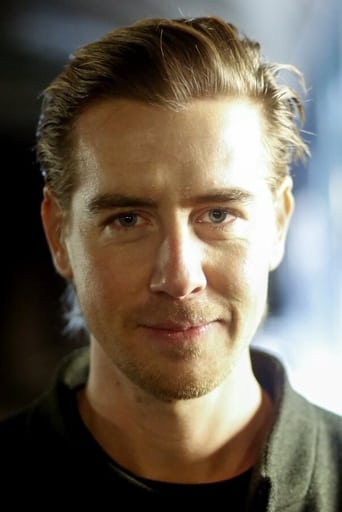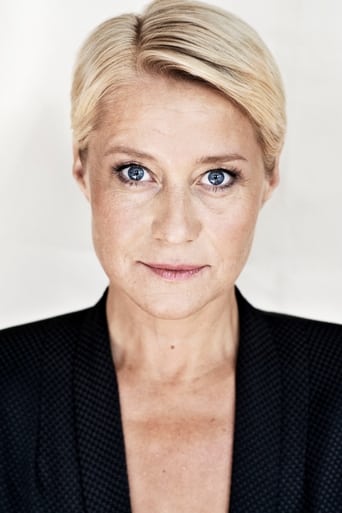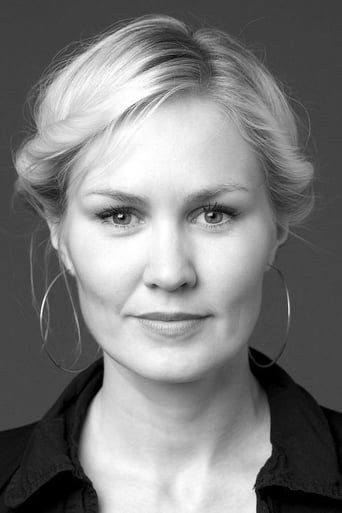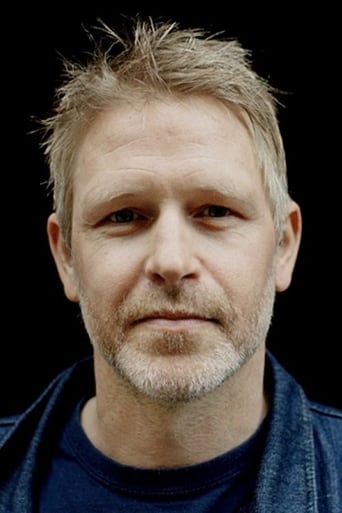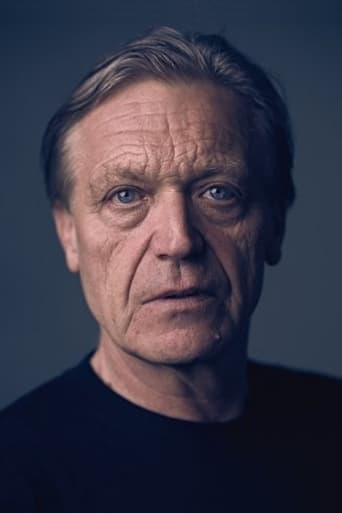SmugKitZine
Tied for the best movie I have ever seen
Suman Roberson
It's a movie as timely as it is provocative and amazingly, for much of its running time, it is weirdly funny.
Zandra
The movie turns out to be a little better than the average. Starting from a romantic formula often seen in the cinema, it ends in the most predictable (and somewhat bland) way.
Guillelmina
The film's masterful storytelling did its job. The message was clear. No need to overdo.
NordicFilm
In director Erik Poppe's film 'DeUsynlige' or Troubled Water when translated into English, follows a young man named Jan Hansen-played by Pål Hagen- who has been just released from a prison sentence because of his role in the death of a young boy when we was a teenager. A broken man, in spirit and body-he has broken fingers on his right hand-in his attempts to re-assimilate into life; he becomes an organist at a local church and befriends a female priest and her young son. While he is starting to get back on his feet, he cannot escape his past crimes as Agnes-the mother of the boy he killed played by Trine Dyrholm-and he himself cannot move on with life. The movie then follows these characters as they still struggle to come to terms with the terrible event that was the young boys death all those years ago. Jan Hansen attempts to bury his past actions, while Agnes's life falls apart as she still believes Jan is dangerous. When Jan becomes a fatherly figure to Jens, the female priest's son, emotions begin to spin out of control. Poppe was long a cinematographer before gaining fame for directing with Hawaii, Oslo in 2004. Troubled Water follows the same line with Poppe's past cinematic style and a plot focused around multiple characters and the drama of human interaction. All of Poppe's movies experiment with color and lighting, showing his past as a cinematographer. However, it is immediately noticeable that there are large departures in the cinematographic style in Troubled Water compared to Hawaii, Oslo; Poppe's previous movies are brightly colored while Troubled Water is tinted grey. While this does sound like a critique-a movement toward an uninspired visual style-the drab coloring is very evocative of the tone and plot of the movie; enhancing emotional punch of the movie. An emotional punch is a very succinct description of the way one feels when viewing Troubled Water. There are often events that are out of our control, or a mistake that can rule the rest of our lives; the question becomes how do we move on with life and advance forward though our past, especially if the event is life defining. This is the central question that Poppe explores in Troubled Water. To quote the Priest-also one of the central messages from the film-"Life goes in different ways". Jan Hansen can never undo his crime, and Agnes will never fully deal with her sons' death; the only solution for these individuals is a form of catharsis. The facing of ones issues head on.One of the most thought provoking elements in Poppe's film is the role of religion. While this theme may be lost of foreign audiences, but the Nordic countries-the main audiences for this film- are deeply secular and unreligious. The movie makes one of the main set pieces a church, and throughout the movie there is a large amount of portrayal of communion and religious services--religion playing a large role is a bold move and a highly deliberate choice. The church is what offers Jan to find his footing-it gives him a much-needed family, a job, and purpose to his life. Troubled Water becomes used as an exploration of what is the role of religion in the deeply unreligious Nordic countries. In an angry explosion by Agnes to the priest about his hiring of a murderer, he calmly replies, "if he doesn't have a second chance here, then where will he?"Poppe continues his excellent reputation he has built on Hawaii, Oslo with Troubled Water. Another excellently crafted human drama that will leave the viewer thinking long after they have finished watching. The dismal color scheme, the story unfolding in small parcels as we learn the truth about past events, the excellent acting performances all come together to make a truly great film. An exploration of how one deals with the tragedies of life and the role of religion even in a deeply secular society, it would do one well to use this movie as a lens and a lesson to view their own life. While the plot and themes may be extreme comparatively, the facing of our own problems is universal.
Thomas Scott
A member of the relatively uncommon subcategory of films that have both an evil protagonist and powerful theistic themes, DeUsynlige, the fourth film from Norwegian director Eric Poppe, is both an engaging redemption tale and a soul-shaking study in faith. The characters are simultaneously good and evil which casts them in a refreshing and extremely human light. They do things like clean coffee off their sweaters and panic when they realize their number comes up. The nigh flawless acting allows for an immense amount of focus to be paid to what is actually happening in the minds of the characters. Viewers are gifted with the increasingly rare experience of glimpsing the raw and pulsating core of the human condition in a manner that is uncommon if not unique.Having seen Hawaii, Oslo, another film directed by Eric Poppe, the two-sided chronologically- simultaneous plot of the film fell right in line with what I have come to expect from Poppe. That said, to say that the split narrative format of the film contributes powerfully to the plot is a dramatic understatement. The split narrative develops first the character of Thomas right up to the re-collision of the two plot lines: the moment when he experiences the bewilderment and sadness in exactly the same fashion as Agnes. The following cut to the scene where Agnes discovers that her child is missing is the single most important component that makes this styling work. It draws the two of them together and unifies them as human beings with flaws and emotions and really frames the emotional distress experienced to the point where you can feel it weighing in your gut. Viewers are reminded that the character they have empathized with though the entire first half of the film has still done some terrible things. It brings the whole work back to reality and glues together the, otherwise quite tricky, split narrative brilliantly.Faith is perhaps the strongest theme throughout the course of the first half of the film. Thomas' views on religion are bleak and lonely. He sees no value in repentance, prayer, or communion; an odd stance for a man who works in a church. As he slowly begins to heal from his past and recover his normalcy his faith undergoes a parallel transformation. His friendship with Anna serves as a tether while he wades through his mixed feelings of guilt and abandon. With her help he comes to terms with what his past entails and begins to find inner solace. He even begins to partake in communion. His growth in faith opens the world to him. He is no longer constrained by his burden of guilt. He becomes purified and baptised in his growing love of Jens and Anna. The priest tells Thomas to "play them some good church music" and Thomas responds by playing "Bridge Over Troubled Water". In an almost fortuitous choice Thomas acknowledges that life is a struggle and suggests that maybe faith has something to do with a bridge to guard them to safety. The first half of the film is Thomas taking baby steps towards that bridge. His efforts to make a normal life despite his crimes are commendable to say the least. He does not seek forgiveness; only re-acceptance. Consequently, baptism is another powerful theme in the film. Baptism is a rite of admission through which an individual is inducted into the whole. With that in mind when Thomas gives up his christened name of "Jan" he is also accepting his separation from society. In the act of wading into the river to save the life of Jens, Thomas is baptised again and reunited as a unified person. His sins are divinely washed away in the current; as Anna said so confidently prior in the film "God forgives all". However the same does not hold true for humans. A Thomas that is washed clean of sin emerges from the river and submits himself for crucifixion. With his admission to Agnes Thomas resurrects the world against him. Anna, the one who whole heartedly preached the plan of God and forgiveness, casts him out and with a pained submissive understanding Thomas accepts the pain of parting with those he cares deeply about.A split-narrative style film so masterfully sewn together by strong religious themes and images fused with expert camera-work put DeUsynlige on a level that is something more than just a powerful redemption tale. Poppe has created something that does far more than tell a story. The film creates an immense sadness and relief that is almost palpable, and for that I give it top marks.
farron34
I thought this film was very delicate, very sad, and beautiful. A story of forgiveness and second chances, atonement and renewal. Several motifs I thought were well used, water being one – representing cleansing and new beginnings. Also the use of an out of focus close-up shot of a face (there were 4 or 5 used), in my opinion, to offer the notion of doing something so awful you become unrecognizable even to yourself.The main character plays the organ, and is mainly the only music used in the film. Which I think works very well, leaving space for moments of contemplation. The two main characters represent polar opposites in what they are trying to do in life (trying to move on from the past v. trying to hold onto the past) – both actors were excellent. I also enjoyed the way the film was divided and structured.
Sinus_Felina
The two main actors are doing excellent work as the immature Jan Thomas and the grief-stricken Agnes, and the organ music is truly powerful. These are the good parts.The bad sides are that the plot is thin, the manuscript uses dubious techniques to get us intrigued and the pacing runs like syrup.The writer, Harald Rosenløw-Eeg is a YA-writer and I think this shows here. The plot deals with morality like typical Norwegian social-realism: the kind of YA-fiction a teacher would recommend. (The kids prefer books about star struck lovers and epic sword-fights, but that's another story).The big problem with the manuscript, in my eyes, is that it delivers the story like it's a crime mystery when in reality it is a heavy character-driven drama. Gradually revealing twist after twist works well in Poirot-style-not-too-realistic-plots, but here it just leaves a sour taste when it is contrasted by the deep-felt character development.The pacing is slow, slow, slow and many of the scenes seems overstated. It could have made a truly great short-film though.

